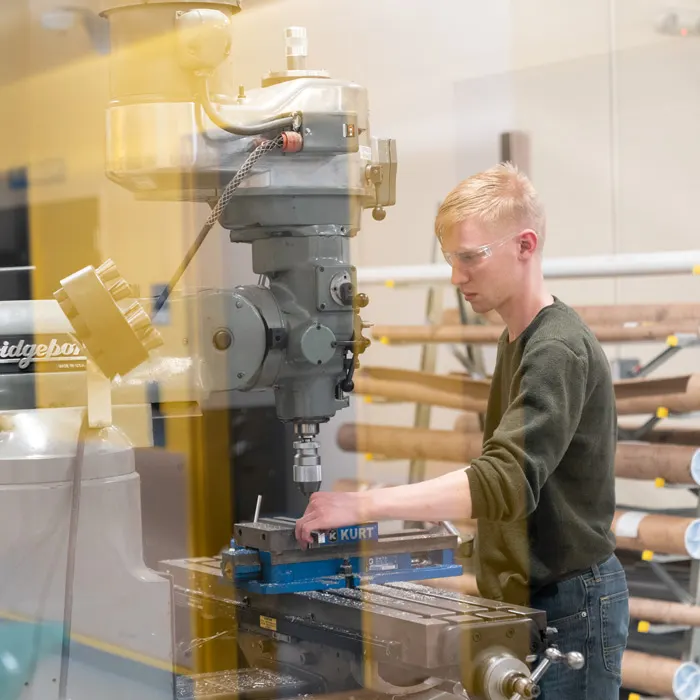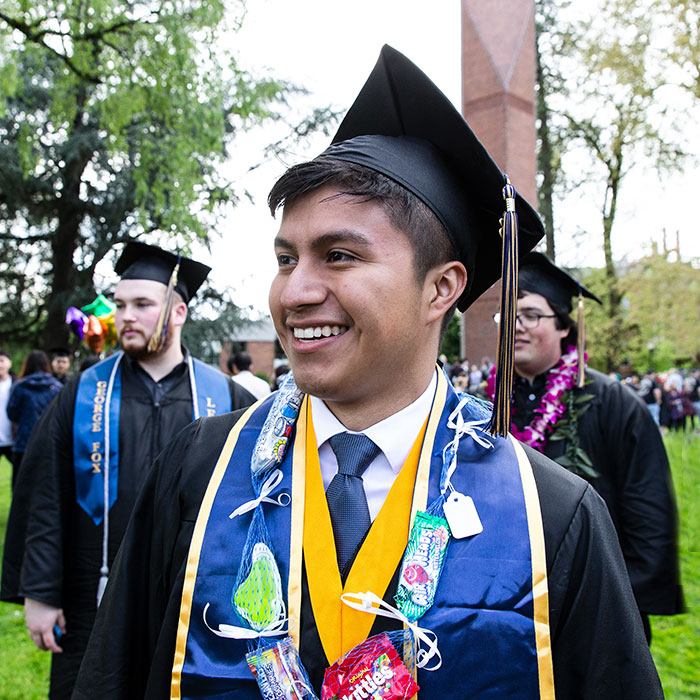At A Glance
Program Type
Bachelor of Science (BS)
Accreditation
Northwest Commission on Colleges and Universities (NWCCU)
Cybersecurity, Artificial Intelligence & Data Science
Experience
Industry mentorship opportunities available

Are you ready to shape the future as a computer scientist? As our lives increasingly become more intertwined with technology, we need thoughtful and Christ-centered problem solvers to create the technology that allows our economies to function. Think about what you could achieve – and the influence you can have – in such a dynamic field!
Our graduates have made their mark at companies that include Amazon, Nike, McAfee, Microsoft, Intel, Amazon and Oracle. Are you ready to bring your influence to some of the most innovative companies across the globe?
Our program will introduce you to the fundamental principles and mechanisms of modeling, abstraction and problem-solving using computers, with an emphasis on core technical skills, real-world problem solving, and hands-on experience.
We’re Big on Service and Building Character
Our students aren’t just here to “get a good job.” They are challenged to take the skills they learn and use them to improve the quality of life for someone else. It’s why every student participates in servant engineering projects designed to help people in need. That might look like developing augmentative communication and physical therapy devices for patients and staff at the Providence Center for Medically Fragile Children in Portland, or designing rugged wheelchairs for individuals suffering with cerebral palsy in Nairobi, Kenya.
Beyond that, the rigor of our program is intended to develop both your technical skills and character. We will push you to grow not only in your academic discipline but also as a mature follower of Christ who leads through humility, service and compassion for others.
Competitions
Are you competitive? If so, you’ll love “suiting up” for competitions that include the International Collegiate Programming Contest, the National Collegiate Cyber Defense Competition, the Department of Energy CyberForce Competition, and the National Cyber League. We consistently place high and often defeat teams from much larger institutions.
In March 2025, a group of George Fox cybersecurity majors, coached by Brent Wilson, placed second at the three-day Pacific Rim Regional of the Collegiate Cyber Defense Competition in Olympia, Washington. In 2024, George Fox finished in the top 20 nationally and in the top five in the western states in a National Cyber League cybersecurity skills competition that included more than 8,500 students from 510 colleges and universities.
Mentorship Opportunities
Students in the engineering program have the opportunity to engage in industry mentorship through the Ignite program. As an Ignite member, you are matched with Christians in the industry. You’ll meet monthly to discover opportunities, develop connections, address career gaps, and ask questions.
Real-Life Experience
As a computer science major, you'll have the opportunity to partner on practical projects that provide hands-on experience. Recently, computer science and engineering students worked together to develop an autonomous robot that could be a game changer for vineyard owners.
The Vitibot, which uses sensors and cameras to collect data and is able to navigate a vineyard autonomously, can predict grape harvest with only a 2-3% margin of error, saving a significant amount of time and money.
Concentrations
Artificial Intelligence & Data Science
It’s hard to go a day without hearing about AI and its impact on all industries – from tech and business to healthcare and education. Artificial intelligence and data science are transforming how people connect, learn and work – and it is only the beginning. In fact, the Bureau of Labor Statistics projects a 36% job outlook growth rate in these fields between 2023 and 2033.
Our artificial intelligence and data science concentration equips you with the technical skills to build large language models and drive innovation, grounded in a strong foundation of ethics and responsible development. You will graduate prepared to enter an evolving field that’s shaping the future.
Cybersecurity
Nearly all of us have been impacted by compromised personal information thanks to hackers and cyber attacks. But attacks are becoming more complex and treacherous to navigate. Want to do something about them?
Our cybersecurity concentration within the computer science major will position you to be a leader in this emerging and essential field. And talk about job security: The Bureau of Labor Statistics projects there will be 32% job growth from 2022 to 2032!
Program Distinctives Why Study Computer Science at George Fox?
-
Teaching is done with hands-on experiences and projects that are practical and engaging.
-
All our faculty have both PhDs and industry experience, ensuring you receive the highest caliber of education with a real-world perspective.
-
Students in the major participate in our servant engineering program, in which we develop projects to benefit people and organizations in our local and global community.
-
Our program goes beyond technical skills. We integrate faith and how it relates to the field of computer science as well as broader culture.
Courses / Curriculum What Will I Study?

Our spaces/Where Will I Learn?
Maker Space: Where Innovative Ideas Come to Life
The facility includes:
- A 24-station computing lab
- Eight meeting rooms with 48-inch monitors
- A wood shop with a large computer numerical control (CNC) router
- A metal shop with a CNC milling machine
- And so much more
These spaces surround an open configurable collaboration space known as "the Hub," a 6,000-square-foot area used by students representing a wide range of majors. The computer labs have the processors and computer systems needed to accommodate the demands of our major.
Career Outlook What’s After George Fox
According to the Bureau of Labor Statistics, employment of computer and information technology occupations is projected to grow 9% from 2024 to 2034, faster than the average for all occupations.
These occupations are projected to add more than 300,000 new jobs, in part due to a greater emphasis on cloud computing, the collection and storage of big data, more everyday items becoming connected to the internet in what is commonly referred to as the “internet of things,” and the continued demand for mobile computing.
- Senior Software Engineer, Intel
- Security Analyst, Nike
- Senior Program Manager, Microsoft
- Software Engineer, Oracle
- Senior Software Engineer, GE
- Analyst for Division of Legislative Finance, State of Alaska
- Senior Support Engineer, Fiserv
- Software Developer, McAfee
- Software Engineering Manager, Mentor Graphics
- Component Design Engineer, Intel
- Manager of Language Modeling Research, Nuance Communication
- National Aeronautics and Space Administration (NASA)
- Microsoft
- Intel Corporation
- Amazon
- Nike
- Florida Institute of Technology/National Science Foundation
- Circle Media Labs
- Maxim Integrated
- Johns Hopkins University
- Northwestern University
- Oregon Health & Science University
- Boston University
- Baylor University
- University of Oregon
- University of Washington
- Oregon State University
- Washington State University
- University of Colorado
- University of Maryland
- University of Minnesota
- George Washington University
- Colorado State University

Lydia Taw's Journey from 'Ground Zero' to Amazon
As a sophomore with no coding experience, Lydia Taw decided to change her major after struggling with a Data Structures course, known by computer science students as the “weed-out class.”
“I got about halfway through that class and I was like, ‘Everybody knows more than I do. I have no coding experience whatsoever. I’m obviously not smart enough to be in this field,’” Taw recalls.
She dropped the class and the major, but her professors wouldn’t have it.
“They encouraged me to look beyond what I thought I was capable of,” she says. “They literally took me from ground zero to Amazon. My professors played a major role in helping me believe in my ability to do this and developing my confidence.

Louis “Toby” Klauder
Class of 2024
Dr. Orr throughout my academic journey was personally and academically engaging. He took the time to truly understand me, and my cohort - and we developed a great relationship over my 3 years at Fox. From artificial intelligence, to popular culture, to Christianity - he was always willing to chat and made learning from him a blast. During my senior year, he helped me to network for a job opportunity that ended up extending me an offer! He truly is a gem within the CS department.
Request Information About Computer Science
